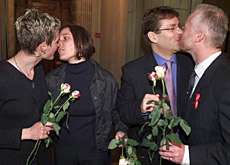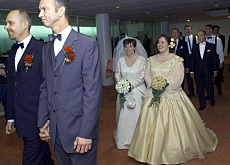Voters to decide on gay partnerships

Voters are to decide on June 5 whether to allow gay couples to register their partnerships - the first referendum of its kind in Europe.
Those in favour of the law say it will give same-sex partners greater rights, but opponents fear that it will undermine traditional marriage and family values.
Under the proposed law, couples would register their partnerships with the authorities and gain the same rights as married couples in the areas of pensions, inheritance and taxes. They would also take on certain legal and financial obligations towards each other.
The new government-backed measures are aimed at stamping out inequalities in the present system, which currently see homosexuals sometimes being excluded from visiting ill partners in hospital or being subject to heavy inheritance taxes.
Not marriage
But Justice Minister Christoph Blocher has stressed that registered partnerships would not have the same status as traditional marriages and that same-sex couples would not be allowed to adopt children or have access to fertility treatment.
“A registered partnership is not a marriage; it is an institution for those people who by definition cannot marry,” said Blocher.
Registered gay partnerships already exist in cantons Geneva, Zurich and Neuchâtel. In canton Zurich alone 483 homosexual couples have registered since the cantonal law came into effect in July 2003.
A yes vote would give a legal framework to gay rights and show the world that whole country has a progressive policy, said Blocher.
The move would bring Switzerland into line with neighbouring Germany and France which have already given the go-ahead to registered partnerships. But Switzerland is so far the only country to vote on the matter.
No campaign
This is because although the legislation was approved by parliament last June, opponents – headed by a small conservative religious party, the Federal Democratic Union – have collected enough signatures to force a referendum on the issue.
The no committee argues that there is no need for new nationwide legislation.
“Our constitution only gives protection to the family and marriage between two heterosexual people. All other lifestyles, including a homosexual way of life, is guaranteed through personal responsibility and must not be regulated by the state,” Federal Democratic Union parliamentarian Christian Waber told swissinfo.
But Waber also maintains that the legislation is a “cultural break” with Christian values and threatens the institution of marriage. For him, marriage is the basis of the state because it assures the next generation.
“The only difference between marriage and same-sex partnerships is adoption and fertility treatment… But in a few years even this could be changed because it will be [considered] discrimination against [homosexuals’] way of life,” he said.
The committee has so far garnered only outright support from one major political party, Blocher’s rightwing Swiss People’s Party.
Others, such as the centre-right Radicals and Christian Democrats, as well as the centre-left Social Democrats, are in favour of the law.
The religious community is also divided. The Roman Catholic Bishops’ Conference is against the law, but the Federation of Protestant Churches in Switzerland supports it.
Vigorous yes campaign
The partnership law also has the support of a vigorous yes campaign, which includes 130 parliamentarians as well as a cross-spectrum of personalities from Swiss society.
“Now gay couples are discriminated against because they cannot secure their relationship in regard to inheritance or visiting rights in hospitals,” campaign spokesman Christian Verdon told swissinfo.
“This law will bring new rights, but also new duties to the couple such as the obligation to support the partner when he or she needs money or to take care of them,” he added.
Verdon dismissed the fears of the law’s opponents that registered partnerships might weaken the institution of marriage, saying that the new legislation was separate and would only affect a small number of people. “It’s not competing with marriage,” he said.
But he added that although the proposed legislation is very advanced, it doesn’t allow for families or symbolic gestures, such as saying yes in a ceremony – like in marriage – or using the same name.
Meanwhile, as the debate rages, the latest polls indicate that the public seems to be in favour of the new measures. A GfS survey published on May 25 put support for the registered partnerships law at 67 per cent.
swissinfo, Isobel Leybold-Johnson
On June 5, Swiss voters will decide whether homosexual couples are to be legally recognised.
Parliament gave the go-ahead last June, but the rightwing Evangelical Party launched a referendum, collecting 66,000 signatures.
The rightwing Swiss People’s Party, to which Christoph Blocher belongs, is the only government party publicly opposed to registered partnerships for gay couples.
Under the proposed law, a same-sex couple will be able to register their partnership at a registry office.
They will receive pension, inheritance, and tax rights as for married couples. Foreign partners will receive residency. But the naturalisation process will not be made easier as with married couples.
Adoption and fertility treatment is forbidden and partnerships can only be dissolved by a court.

In compliance with the JTI standards
More: SWI swissinfo.ch certified by the Journalism Trust Initiative


You can find an overview of ongoing debates with our journalists here. Please join us!
If you want to start a conversation about a topic raised in this article or want to report factual errors, email us at english@swissinfo.ch.